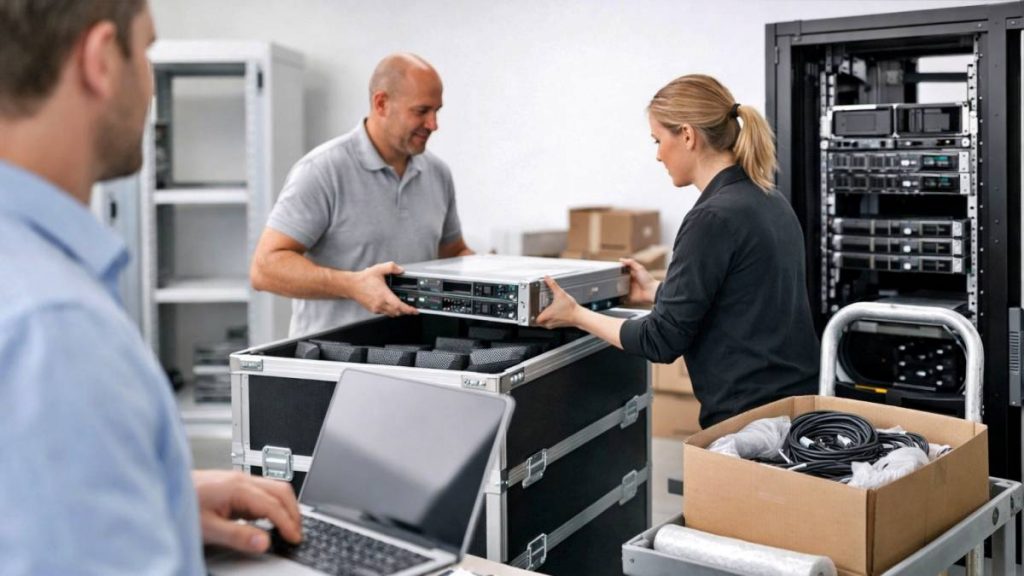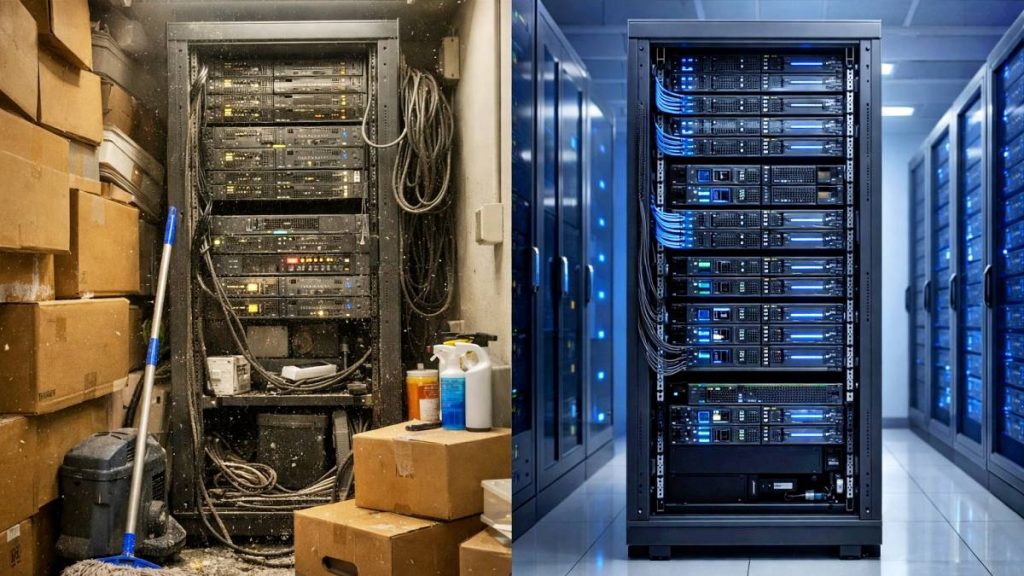As hybrid work becomes the norm rather than the exception, businesses face a critical challenge: how to support a distributed workforce with fast, secure, and reliable IT infrastructure without overextending budgets or internal resources. For many organizations, the answer lies in colocation.
Colocation, the practice of housing privately owned servers and networking equipment in a third-party data center, is increasingly becoming a foundational strategy for enabling hybrid work environments. By offloading the physical infrastructure burden while retaining full control over their IT stack, businesses can maintain the flexibility and scalability needed to support employees working from anywhere.
In this article, we’ll explore how colocation empowers hybrid teams, the technical advantages it delivers, and the tangible business benefits it brings. We’ll also take a look at how Datacate’s colocation services are purpose-built to support this new way of working.
The New Normal: Distributed Teams and New IT Demands
Hybrid work models offer flexibility and productivity gains but also introduce new complexities:
- Access from anywhere means IT must ensure high availability and performance regardless of location.
- Security threats increase with endpoints spread across homes, offices, and co-working spaces.
- Collaboration tools, cloud services, and VPNs must work seamlessly and reliably.
- Scalability becomes necessary to adapt quickly to changing team sizes and resource demands.
Traditional on-premises infrastructure, particularly that hosted in an office server room or closet, is rarely up to the task. These environments are vulnerable to power outages, internet disruptions, and security risks, and they often lack the redundancy and bandwidth needed for continuous uptime.
This is where colocation steps in as a smart, forward-looking alternative.
Colocation: A Strong Foundation for Hybrid Work
Colocation offers businesses a path to a more resilient and high-performance IT environment—without sacrificing control. Let’s examine how.
1. High-Speed, Low-Latency Connectivity
Hybrid workers rely on real-time collaboration, cloud access, and video conferencing. Downtime or lag isn’t just an inconvenience; it’s a productivity killer. Colocated infrastructure resides in a purpose-built facility with enterprise-grade internet connectivity, optimized routing, and redundant uplinks.
Datacate’s data center, for instance, provides:
- Carrier-neutral bandwidth options with diverse fiber paths
- Low-latency access to cloud providers and ISPs
- Private networking and MPLS support for hybrid environments
This ensures that distributed employees get the performance they need to stay productive—no matter where they are.
2. Robust Physical and Cybersecurity
Securing IT assets is harder when staff and endpoints are scattered. A colocated environment significantly reduces exposure by centralizing your infrastructure in a physically secure and monitored facility.
At Datacate, this includes:
- 24/7 facility access control with biometric verification
- Video surveillance and alarm systems
- Fire suppression and environmental monitoring
- Tiered security zones
From a cybersecurity standpoint, centralizing infrastructure enables stronger perimeter defense and better enforcement of network access controls. Colocation also pairs naturally with endpoint management and identity solutions, supporting a zero-trust architecture—a key component of secure hybrid work.
3. Redundant Power and Cooling for Business Continuity
In a hybrid model, your team may work from home, but your infrastructure still needs to be “always on.” Office-based servers are vulnerable to local outages, which can be catastrophic if systems support real-time operations.
Colocation provides:
- Multiple redundant power sources and UPS systems
- Industrial-grade HVAC and cooling systems
- Backup generators with fuel reserves
- Automated environmental controls and alerts
Datacate’s data center is designed for 99.999% uptime, ensuring your infrastructure stays online even if the office goes dark. That kind of resilience is essential when hybrid teams depend on remote access.
Colocation + Cloud: A Powerful Hybrid Solution
Many hybrid work strategies combine on-premises systems, cloud services, and hosted applications. Colocation doesn’t compete with the cloud; it complements it.
1. Cloud Adjacent Infrastructure
By colocating near your cloud providers (e.g., AWS, Microsoft Azure, Google Cloud), you can reduce latency, simplify hybrid deployments, and lower data egress costs. Datacate offers direct peering and cloud gateway options to optimize performance across hybrid workloads.
2. Data Residency and Compliance
Some workloads or data types require physical separation from public cloud environments—especially in regulated industries. Colocation allows you to maintain ownership and control while still achieving high availability, making compliance with HIPAA, PCI-DSS, SOC 2, and similar standards easier.
Datacate meets stringent compliance frameworks and offers an audit-ready infrastructure that supports your organization’s security and privacy mandates.
3. Hybrid Scalability
Do you need to burst compute or storage capacity to the cloud while retaining on-prem performance for core systems? Colocation enables hybrid architectures that scale without ripping and replacing your existing systems.
Datacate offers rack-to-cloud integration, making it easy to scale up and down as business needs evolve.
The Business Case for Colocation in the Hybrid Era
The technical advantages of colocation translate directly into business value:
1. Cost Predictability and Efficiency
Running your own server room comes with hidden costs: power, cooling, maintenance, space, internet, and staff time. Colocation consolidates these into a predictable monthly cost—often at a lower total cost of ownership.
Datacate’s flexible pricing and right-sized solutions ensure that you only pay for the space, power, and bandwidth you need.
2. Reduced Downtime and IT Headaches
Unplanned outages cost money. So do slow VPNs, poor file sync, and dropped video calls. With colocated infrastructure supporting your hybrid workforce, IT teams spend less time putting out fires and more time enabling growth.
Datacate’s 24/7 local support team is available to respond to alerts, troubleshoot issues, and even perform hands-on tasks, reducing your dependency on internal resources.
3. Faster Time to Scale
Whether you’re opening a new office, onboarding remote workers, or rolling out a new application, colocated infrastructure supports rapid deployment and consistent performance without the need to build out physical infrastructure each time.
With Datacate’s provisioning and cross-connect options, your systems are ready to serve remote users on day one.
Datacate: Your Colocation Partner for the Hybrid Work Era
Datacate’s colocation services are designed from the ground up to support distributed teams, hybrid architectures, and business-critical workloads. Here’s what sets us apart:
- Privately owned and operated facility near Sacramento, CA
- Multiple levels of redundancy for power, cooling, and connectivity
- Carrier-neutral bandwidth and cross-connect options
- 24/7 on-site support from U.S.-based technicians
- Compliance with HIPAA, PCI-DSS, SOC 2 Type II, and CSA STAR
- Customizable racks, cages, and hybrid deployment support
Whether transitioning from an office server room or expanding your hybrid capabilities, Datacate provides the reliable infrastructure foundation your business needs—without the complexity and cost of public cloud sprawl or the risks of aging on-site hardware.
Conclusion: Empowering the Future of Work
Hybrid work is here to stay, so IT infrastructure must evolve to meet the demands of a distributed, always-on workforce. Colocation offers a strategic, secure, and cost-effective solution to support this shift, giving businesses the performance and reliability they need to thrive.
By partnering with a colocation provider like Datacate, your organization can confidently embrace hybrid work, knowing that your infrastructure is in expert hands.
Ready to future-proof your IT for hybrid work?
Contact Datacate today to schedule a free consultation and learn how colocation can support your team, wherever they are.








